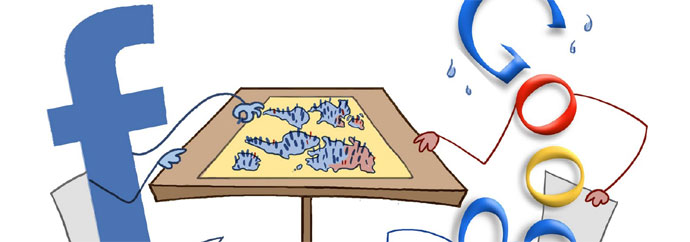
Here’s an amazing statistic – last year (2015) Facebook and Google, combined, took an extra $1 billion in advertising revenue from the Australian market.
An extra billion. Not a billion in total, an extra billion, than the year before.
The thing is, the total ad market in Australia only grew by $300 million in 2015, which means every other advertising medium – print, TV, radio cinema, outdoor, online… – collectively took $700 million LESS combined.
This meant that every TV station, radio, cinema, newspaper, magazine and website was competing for a shrinking market, $700 million less than it was the year previously.
Ouch. No wonder we see redundancies in newspaper organisations, TV and radio stations the country over. And of course, this is not a phenomenon unique to Australia. If anything, we’ve been protected from it for a few years, but the impact is now in full force.
If you thought the ad model was a tough one, no stat makes starker reading than this one for Australian media organisations. Imagine a startup trying to make a go of it with an ad revenue model.
This trend of ad dollars to the 2 Silicon Valley organisations is only speeding up.
Recent predictions have Facebook and Google eating up 90% of all digital advertising by the year 2020. This means that as non digital ads continue to decline in size, there is no respite in digital ads, because the 2 internet mega-goths are gobbling that up too.
Now I have nothing against Facebook or Google. Like you, I use them all the time. I rely on Google to get me all the answers to the questions I pose during my day, as well as entertain and inform me on what’s going on. I flick through my FB feed once or twice a day, and it’s entertaining stuff. I deploy FB page at work. In business, most of my promotional budget goes on the 2 of them through Adwords or customised FB posts, and I’m not alone (as the stats above prove).
The question I have is: what kind of world are we hurtling towards, if these trends continue?
I am also a big fan of Uber, Airbnb, Netflix, Twitter, Apple, LinkedIN and the like. All of these are collectively eating away at our industrial and digital base, and employ very few Aussies by comparison to organisations of similar revenue. Very little of the income they earn in our country attracts any tax that remains in our country. They are all US-headquartered yet through various organisational structures manage to conduct their affairs via satellite organisations based in Ireland or Singapore. Although they take huge amounts of Aussie dollars from selling services to Aussies in Australia, they are not contributing as much as similar sized organisations that hold sway over large markets. They are not paying for the roads, schools, hospitals and defence that the government needs to provide. Meanwhile they are attacking up to 25% of our GDP, over the next decade.
I wonder if and when Australia (and other countries) will wake up to this? The answer is not to put bans on them (as the taxis tried to do over Uber), or ignore them (as the newspaper industry did for years until it was too late). The answer is surely to develop our own home-grown digital companies that will compete with them here and perhaps abroad. Companies like Atlassian, Canva and Freelancer. (How many successful Aussie tech companies can you name? Here’s a link to the top 50.)
I am amazed at the local tech talent here, and if we could release more funding, I reckon we’d throw enough darts at the dartboard to see if we can create some bulls eyes. It’s fast becoming a necessity now, not a ‘nice thing to have’. What economy are we going to leave behind for our kids if we don’t?
More reading:
‘How Facebook is slowly eating the world‘, Washington Post, April 2016
‘20 Ways Facebook is eating the internet‘, Techcrunch
‘Mobile ate the world, and Facebook and Google are eating mobile‘, Salesforce, June 2016



